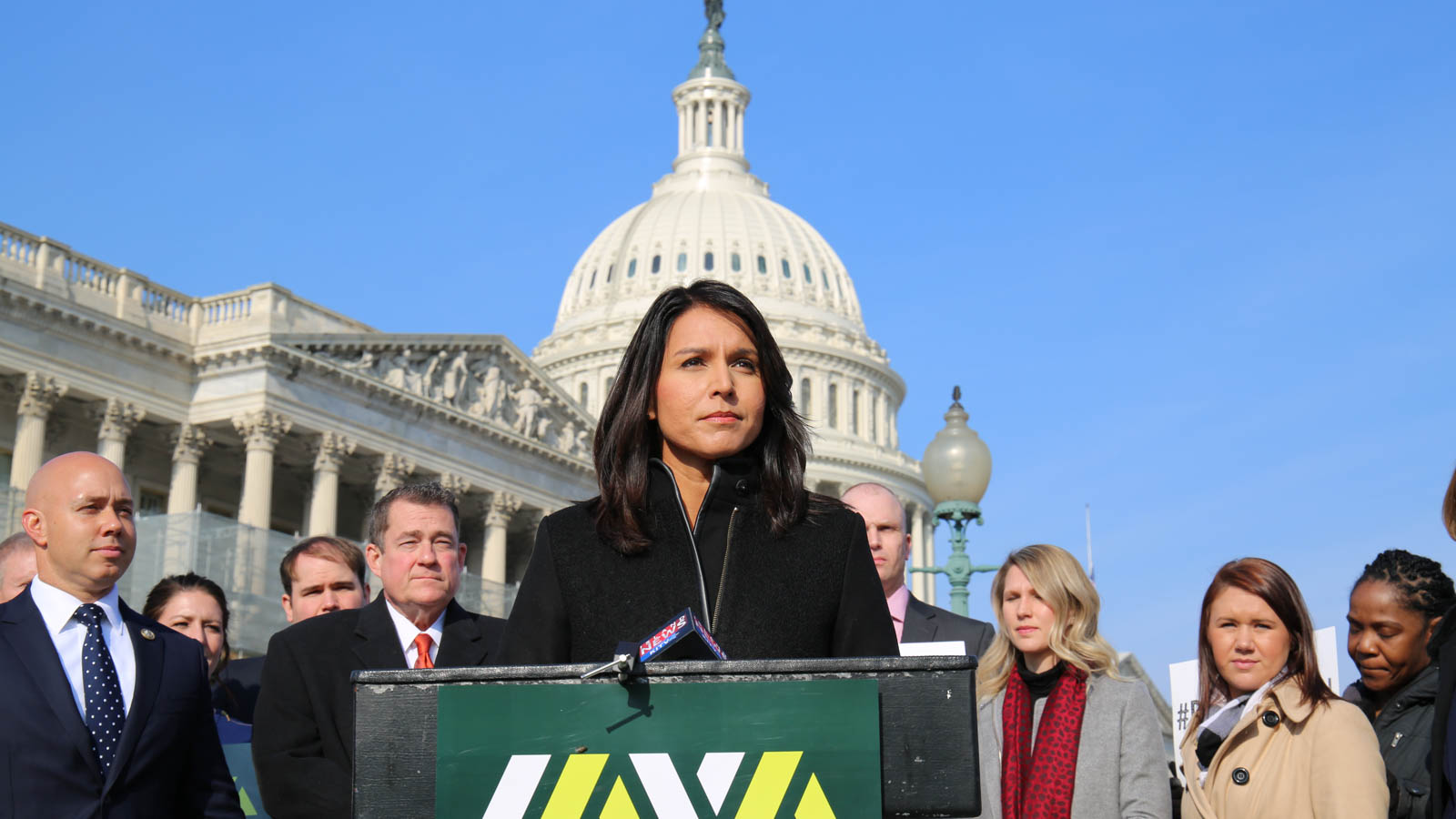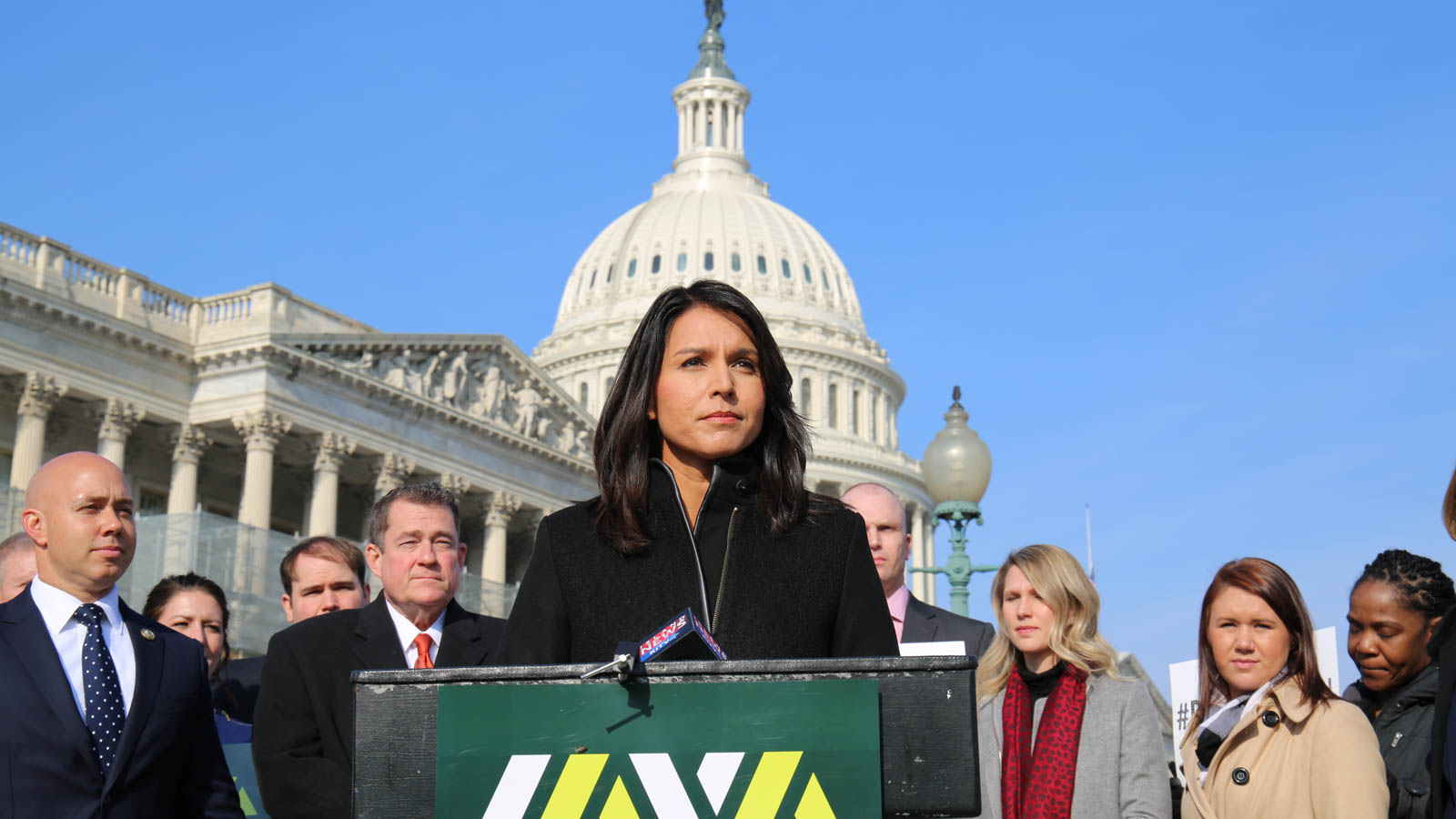
Democratic U.S. Rep. Tulsi Gabbard of Hawaii says that ending the federal prohibition of marijuana is smart policy and, on March 7, 2019, she introduced legislation in Congress to do just that.
The 2020 presidential candidate also appears to know that endorsing cannabis legalization is smart politics.
“The fact that marijuana’s still a Schedule I drug is unacceptable in the harm that it is causing to the people of our country and to taxpayers as well,” Gabbard said in a phone interview.
Gabbard and Republican U.S. Rep. Don Young of Alaska teamed up to file two new cannabis bills. One would remove marijuana from the Federal Controlled Substances Act — a process known as descheduling — so that states can set their own laws without interference.
“The impact this has on individuals, potentially leading to criminal records that impact them, their families, their ability to get a job, housing, financial aid for college — the impacts of this are great,” she said of the hundreds of thousands of arrests for cannabis offenses that take place every year in the U.S. “That’s not to speak of the impact on states, small businesses and banks in those states that have legalized some level of marijuana.”
# of people arrested for marijuana law violation in 2017: 659,700
# of those charged with marijuana law violations arrested for possession only: 599,282 (90.8 percent)
I intro’d bipartisan bill today to END THE FEDERAL MARIJUANA PROHIBITION. Congress must act now #EndTheDrugWar pic.twitter.com/vbMV01nSRv
— Tulsi Gabbard (@TulsiGabbard) March 7, 2019
The other new House proposal from the bipartisan duo would require the federal government to study the effects of state marijuana legalization policies.
“There are still a lot of myths and outdated information and stigma that are being used as excuses to not push forward these very impactful policy changes,” Gabbard said.
The legislation, under which several federal agencies would be tasked with compiling information on the economic, health, criminal justice, and employment effects of state cannabis laws, would generate “one central study providing facts on what the impacts have already proven to be in states that have legalized marijuana at one level or another,” the congress member said.
Gabbard, who during her presidential campaign launch speech in February 2019 criticized a system that “puts people in prison for smoking marijuana while allowing corporations like Purdue Pharma, who are responsible for the opioid-related deaths of thousands of people, to walk away scot-free with their coffers full,” shared her thoughts on the likelihood that someone who doesn’t support legalization could with the Democratic nomination.
“I think it would be very difficult, but obviously this is something that voters will have to contend with and a question I’m sure they’ll be asking in states across the country of those who are seeking that office,” she said.
“Regardless of who it is, this is a major issue I’m putting at the forefront of my campaign and continuing the work that I’ve been doing in Congress to bring about this change,” Gabbard said. “It’s something I’ve continued to bring up in bigger cities as well as small towns in New Hampshire and Iowa and other states, and it’s an issue that is very exciting to voters who believe, as I do, that we’ve got to make this happen.”
She said that “freedom of choice” is a key reason she has focused so much on cannabis during her time on Capitol Hill.
“I don’t smoke marijuana. I never have,” she said. “But I believe firmly in every person’s freedom to make their own choices, and that people should not be thrown in jail and incarcerated or made into criminals for choosing to smoke marijuana whether it be for medicinal and non-medicinal purposes.”
Today @repdonyoung and I introduced the only bipartisan legislation in Congress that reschedules marijuana thereby ending the federal prohibition. This is long overdue. We must end the failed War on Drugs before we lose another generation to this war. https://t.co/wgaFKGqYeX
— Rep. Tulsi Gabbard (@TulsiPress) March 7, 2019
In the interview, Gabbard also addressed her views on the broader war on drugs, saying that many of the arguments reform advocates make about marijuana can be applied to other substances as well.
“I think that there’s no question that this overall war on drugs has not only been a failure, it has created and exacerbated a number of other problems that continue to afflict people in this country,” she said, adding a teaser that “this is something that I’m working on, on my presidential campaign that we will be rolling out a detailed policy position statement on.”
When it comes to marijuana, Gabbard believes that Congress is well-positioned to advance far-reaching reform bills in 2019, at least through one chamber.
In 2017 alone, our country arrested 600,000 people just for possession of marijuana. Our bipartisan legislation takes a step toward ending the failed War on Drugs, ending the federal prohibition on marijuana, and ensuring that our policies are guided by facts and the truth.
— Rep. Tulsi Gabbard (@TulsiPress) March 7, 2019
“We are hopeful that there will be a great opportunity to pass pieces of legislation in the House of Representatives given that we have the majority,” she said, referring to Democrats. “We will have some more work to do to get these bill through the Senate. But if members of Congress and leaders in Washington listen to the voices of the vast majority of Americans in this country, they will hear the calls for action that go beyond partisanship. We are long past time to bring about this kind of change.”
And she believes her home state of Hawaii — where a bill to legalize marijuana was approved by a legislative committee last month — is on track to end cannabis prohibition sooner rather than later.
“Momentum is moving in the right direction,” she said, but added that she’s “disappointed” the bill wasn’t approved by a second committee in time to advance further in the process in 2019.
“I think that we’re only going to continue to see more progress being made,” she said.
Gabbard also referenced incremental cannabis reform moves in the state, such as a bill that lawmakers approved last year to add opioid addiction as a medical marijuana qualifying condition. Democratic Gov. David Ige ultimately vetoed the measure, which she said left her and other supporters “not only disappointed but pretty pissed off.”
That setback is another reason to push her new congressional bill requiring the federal government to compile information on the impact of cannabis policies, she argued.
“Even in a state like Hawaii, if you look back to the governor’s statements about why he vetoed that bill, there are still a lot of myths and outdated information and stigma that are being used as excuses to not push forward these very impactful policy changes,” Gabbard said.
“So that is one of the main reasons that is spurring my bill, to be able to provide this from the National Academy of Sciences as an undisputed collection of data and studies saying you can’t dispute this. You can’t just pick and choose anecdotes that you want to talk about.”
Gabbard and Young, her Republican co-sponsor for the two new cannabis bills, are actively seeking support from other lawmakers for the proposals.
“The Ending Federal Marijuana Prohibition Act of 2019 is our opportunity to remove marijuana from the federal Controlled Substances list and to allow our states the freedom to regulate marijuana as they choose, without federal inference,” they wrote in a letter asking colleagues to cosponsor the descheduling legislation.
Our archaic marijuana policies– based on stigma and outdated myths–have been used to wage a failed War on Drugs. Families have been torn apart, communities left fractured, and over-criminalization and mass incarceration have become the norm. https://t.co/KuG384QhnJ
— Rep. Tulsi Gabbard (@TulsiPress) March 7, 2019
“The purpose of this legislation is to collect and synthesize relevant data and to generate a federally recognized, neutral report regarding the impact of statewide marijuana legalization schemes,” they wrote in a separate letter about the second bill, which is called the Marijuana Data Collection Act. “Such a report will assure that federal discussions and policies specific to this issue are based upon the best and most reliable evidence available at this time.”
Prior versions of both bills filed during the last Congress did not receive hearings or votes.
But Gabbard said now is the time for action.
“We can’t afford to kick this can down the road given the devastating negative impact it is having on the people of this country,” she said, referring to marijuana prohibition.
Meanwhile, several senators who are also seeking the 2020 Democratic presidential nomination joined together in early March 2019 to file far-reaching legislation that would deschedule marijuana. That bill also contains provisions aimed at expungements and investment in communities previously harmed by the war on drugs.
A national poll released March 6 found that 60 percent of voters support legalizing marijuana.
This article has been republished from Marijuana Moment under a content syndication agreement. Read the original article here.











